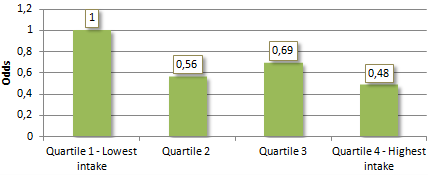|
Definition: "An ergogenic aid is any substance or phenomenon that enhances performance "
|
|
||||||||
13.11.2015 |
|
|
Vitamin B6 protects against Parkinson's
Lifestyle and Parkinson's
And then there's vitamin B6 too [structural formula shown above].
Epidemiologists have regularly come across evidence of the protective effect of vitamin B6. In 2010, for example, Japanese epidemiologists published a small study in which they compared the diet of several hundred people with Parkinson's with that of a group of healthy people. [Br J Nutr. 2010 Sep;104(5):757-64.] The Japanese discovered that a relatively high vitamin B6 intake reduced the chance of Parkinson's developing.
Meta-study
A relatively high intake of vitamin B6 did offer protection, however. People who consumed relatively large amounts of vitamin B6 were 35 percent less likely to develop Parkinson's than people who had a low vitamin B6 intake.
Explanation
"Oxidative stress has been widely accepted to play an important role in the pathogenesis of Parkinson's Disease", wrote Shen. "Besides its function as a cofactor, vitamin B6 is reported to possess antioxidant activity. Pyridoxine is found to exhibit singlet oxygen quench capacity comparable with those of highly efficient antioxidants vitamins C and E. It was demonstrated that vitamin B6 deficiency can lead to oxidative stress in rat liver and heart, while vitamin B6 supplementation can alleviate oxidative stress."
"Thus, based on these evidences, it is proposed that besides regulating homocysteine levels the antioxidant potential of vitamin B6 may lower the risk of PD through inhibiting oxidative stress."
Conclusion Source:
More: Archives:
|
|
|||||||||||||||||






